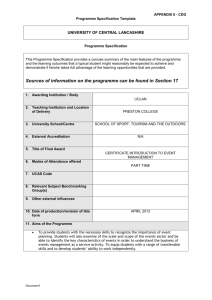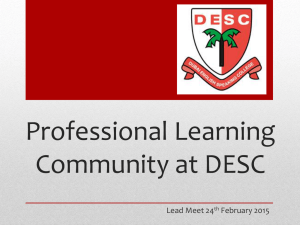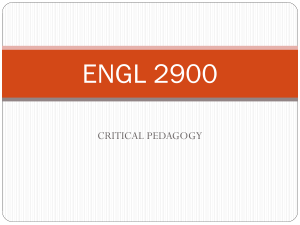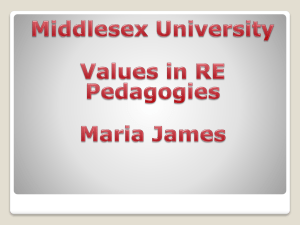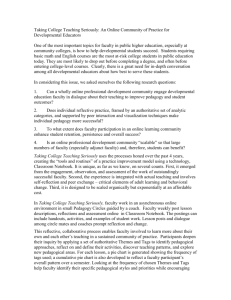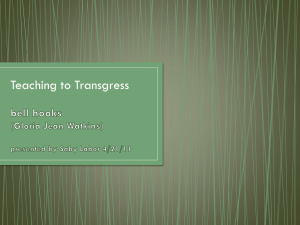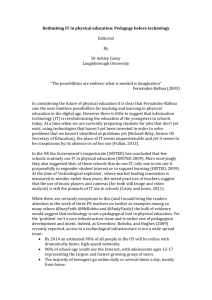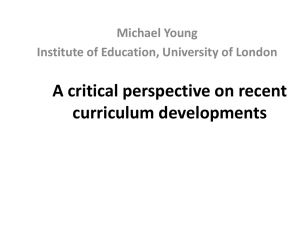cert_social_pedagogy_theory_and_practice
advertisement
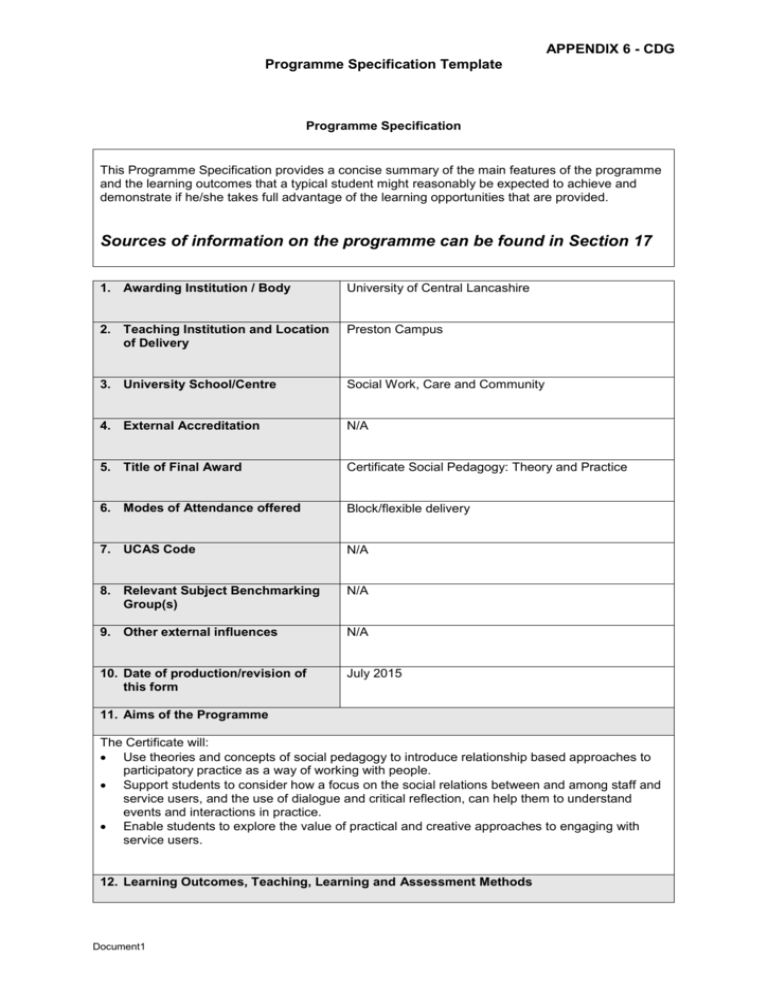
APPENDIX 6 - CDG Programme Specification Template Programme Specification This Programme Specification provides a concise summary of the main features of the programme and the learning outcomes that a typical student might reasonably be expected to achieve and demonstrate if he/she takes full advantage of the learning opportunities that are provided. Sources of information on the programme can be found in Section 17 1. Awarding Institution / Body University of Central Lancashire 2. Teaching Institution and Location of Delivery Preston Campus 3. University School/Centre Social Work, Care and Community 4. External Accreditation N/A 5. Title of Final Award Certificate Social Pedagogy: Theory and Practice 6. Modes of Attendance offered Block/flexible delivery 7. UCAS Code N/A 8. Relevant Subject Benchmarking Group(s) N/A 9. Other external influences N/A 10. Date of production/revision of this form July 2015 11. Aims of the Programme The Certificate will: Use theories and concepts of social pedagogy to introduce relationship based approaches to participatory practice as a way of working with people. Support students to consider how a focus on the social relations between and among staff and service users, and the use of dialogue and critical reflection, can help them to understand events and interactions in practice. Enable students to explore the value of practical and creative approaches to engaging with service users. 12. Learning Outcomes, Teaching, Learning and Assessment Methods Document1 APPENDIX 6 - CDG Programme Specification Template A. Knowledge and Understanding On successful completion of the programme students will be able to: A1. Critically appraise concepts of social pedagogy A2. Evaluate the relevance of social pedagogy to social care work A3. Understand the importance of reflection on social relations between staff and service users A4. Demonstrate knowledge of creative ways of engaging with service users A5. Understand the ways in which individuals are located within a social context Teaching and Learning Methods This certificate integrates: lectures; workshops; small group work; self-directed study; reflective exercises and practical experience. This delivery plan provides students with the opportunity to develop and apply their understanding of social pedagogy theory, values and approaches. Teaching will draw on interactive and experiential learning through practical activities that let students experience the challenges around communication and enable the group to apply their learning and reflect on their own value base through direct work experience and the use of role play and case studies to encourage students to share practice examples from their own experience to discuss theory. Assessment methods Reflective essay and creative task B. Subject-specific skills On successful completion of the programme students will be able to: B1. Critically explain how the theoretical approaches taught can be applied to the understanding of individuals B2. Critically consider how ideas about, and understanding of social pedagogy can be used to inform practice with different service user groups B3. Demonstrate an ability to apply social pedagogy’s core values and skills in their work B4. Demonstrate an ability to engage with individuals and groups creatively B5. Demonstrate self-reflection on personal values and relationship with others Teaching and Learning Methods This certificate integrates: lectures; workshops; small group work; self-directed study; reflective exercises and practical experience. This delivery plan provides students with the opportunity to develop and apply their understanding of social pedagogy theory, values and approaches. Teaching will draw on interactive and experiential learning through practical activities that let students experience the challenges around communication and enable the group to apply their learning and reflect on their own value base through direct work experience and the use of role play and case studies to encourage students to share practice examples from their own experience to discuss theory. Assessment methods Reflective essay and creative task C. Thinking Skills On successful completion of the programme students will be able to: C1. Consider critically the benefits of adopting a social pedagogical approach to working with people. C2. Be able to deal with complex issues in a creative and systemic way C3. Tackle and solve problems in original ways C4. Be able to apply the methods and techniques learned to reflect upon, review, consolidate and apply their knowledge and understanding C5. Empathic understanding of service users’ lifeworlds Teaching and Learning Methods Document1 APPENDIX 6 - CDG Programme Specification Template This certificate integrates: lectures; workshops; small group work; self-directed study; reflective exercises and practical experience. This delivery plan provides students with the opportunity to develop and apply their understanding of social pedagogy theory, values and approaches. Teaching will draw on interactive and experiential learning through practical activities that let students experience the challenges around communication and enable the group to apply their learning and reflect on their own value base through direct work experience and the use of role play and case studies to encourage students to share practice examples from their own experience to discuss theory. Assessment methods Reflective essay and creative task D. Other skills relevant to employability and personal development On successful completion of the programme students will be able to: D1. Discuss the benefits of adopting a social pedagogical approach to working with people D2. Communicate clearly and effectively with a wide range of audiences D3. Development of and reflection on own learning D4. Evaluate and review learning D5. Adopt multi-agency working skills Teaching and Learning Methods This certificate integrates: lectures; workshops; small group work; self-directed study; reflective exercises and practical experience. This delivery plan provides students with the opportunity to develop and apply their understanding of social pedagogy theory, values and approaches. Teaching will draw on interactive and experiential learning through practical activities that let students experience the challenges around communication and enable the group to apply their learning and reflect on their own value base through direct work experience and the use of role play and case studies to encourage students to share practice examples from their own experience to discuss theory. Assessment methods Reflective essay and creative task Document1 APPENDIX 6 - CDG Programme Specification Template 13. Programme Structures* Level Level 7 Module Code SW4721 Module Title Social Pedagogy: Theory and Practice 14. Awards and Credits* Credit rating 20 Certificate Social Pedagogy: Theory and Practice Requires 20 credits at Level 7 or above 15. Personal Development Planning Personal Development Planning (PDP) is intended to provide a process by which students can reflect on their learning and plan for their personal and career development. The primary objective of PDP is to improve each student’s capacity to understand what and how they are learning, and to review, plan and take responsibility for their own learning. PDP will be facilitated through individual and group reflection, and group tutorials. The ability to reflect is central to the underpinning ethos of this programme. The course team will provide individual advice and discuss progress and future career or further study plans with students as a fundamental part of the tutorial role, and encourage students to make use of all of the University’s range of support services as and where appropriate. 16. Admissions criteria Programme Specifications include minimum entry requirements, including academic qualifications, together with appropriate experience and skills required for entry to study. These criteria may be expressed as a range rather than a specific grade. Amendments to entry requirements may have been made after these documents were published and you should consult the University’s website for the most up to date information. Students will be informed of their personal minimum entry criteria in their offer letter. Applicants will normally hold a degree, classified at 2:2 or above Applicants will normally be practitioners in an area of social work or social care 17. Key sources of information about the programme UCLan website – course information School of Social Work, Care and Community website THEMPRA website Course factsheet Document1 APPENDIX 13 - CDG 7 18. Curriculum Skills Map Please tick in the relevant boxes where individual Programme Learning Outcomes are being assessed Programme Learning Outcomes Core (C), Other skills relevant Compulsory to employability and Module (COMP) or Knowledge and personal Level Code Module Title Option (O) understanding Subject-specific Skills Thinking Skills development Note: Social Pedagogy: Theory and SW4721 Practice C A1 A2 A3 A4 A5 B1 x x x Xx x B2 B3 x x B4 B5 C1 C2 C3 C4 C5 D1 D2 D3 D4 D5 Xx x x x Xx x x x Xx Mapping to other external frameworks, e.g. professional/statutory bodies, will be included within Student Course Handbook V2 – July 2015
